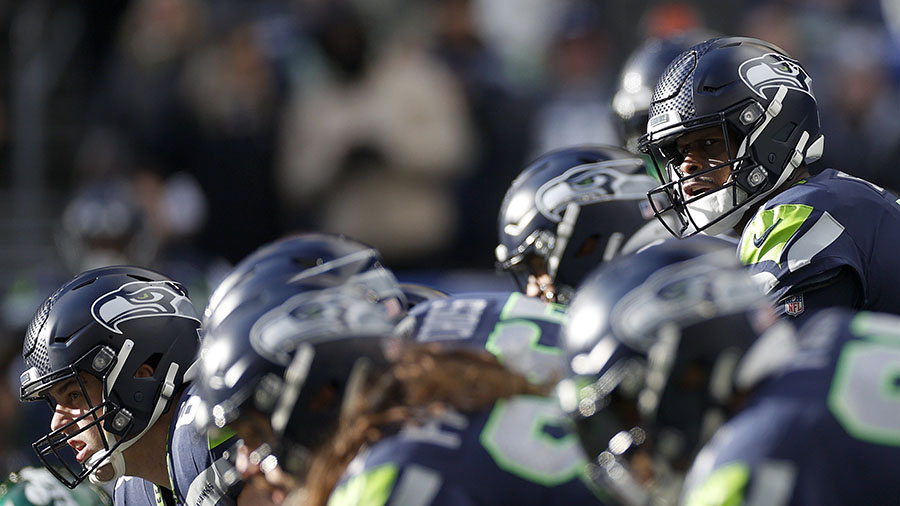
The problem with the Seattle Seahawks’ biggest problem is that it affects everything else.
How Seattle Seahawks aim to rebound from ‘sobering’ step back
And by that, I mean if you’ve got a huge problem with your offensive line, then you have a problem with your quarterback’s ceiling. You have a problem taking advantage of high-priced wide receivers. You have a problem establishing the run. You have a third-down problem. You have a time-of-possession problem.
To struggle with either side of the most fundamental group in football — the trenches — is to struggle everywhere. This isn’t a team like the Buffalo Bills or Kansas City Chiefs who are a wide receiver trade away from taking a step forward. This is a team that’s trying to solve a decade-long problem.
Is the old Russell Wilson back? Brock Huard shares what he sees
Two things here are fundamentally true: first, it’s hard to draft and develop offensive linemen, and the league is seeing issues for a lot of teams. Secondly, that some teams are making it work regardless.
• What’s wrong with offensive line play?
Former Rams offensive lineman and current NFL analyst Andrew Whitworth joined Kevin Clark’s “This is Football” podcast and said that while there are some stellar offensive linemen in today’s league, in totality it remains a problem. For him, there are a couple factors.
First, the development and skill of defensive linemen has skyrocketed (and a few of those defensive tackles could have been, or perhaps started as, offensive linemen). Secondly, while an overall good of the CBA practice rules is that it protects player health, he fears the league may have skewed too far toward safety and away from preparedness. Third, and on a very related note, many of these young offensive linemen need those additional reps because fewer college teams are preparing them for the NFL in spread offenses.
“It’s not just because they’re young playing in the NFL,” Whitworth said. “It’s because the college system isn’t anything like the NFL system. These guys barely have to block. So I just think they’ve coming in unprepared.”
• What works for some teams
With all of that being true, it’s still necessary to make that unit as strong and complete as possible, and there are some teams doing that — and they’re doing it in different ways.
The Detroit Lions have one of the league’s best units, with first-round draft capital invested in their three most important positions. Starting right tackle Penei Sewell was the seventh overall pick in 2021. Center Frank Ragnow was 20th overall in 2018. Left tackle Taylor Decker was 16th overall in 2016. Bot not every starter was a Lions’ first-round selection. Right guard Kevin Zeitler was 27th overall in 2012 by the Bengals but signed with Detroit as a free agent earlier this March, while starting left guard Graham Glawgow was a third-round pick back in 2016 and is in his second stint with the team after spending three seasons with the Broncos.
The Chiefs added key starters on their line in free agency. Left guard Joe Thuney signed a five-year, $80 million deal in 2021. Several other starters — tackle Jawaan Taylor, center Creed Humphries, or guard Trey Smith — are Day 2 draft picks or later.
• A PSA about contracts
The Lions have money invested in quarterback and wide receiver, while the Chiefs have money invested in quarterback and defensive tackle.
I say this to make this point: a common critique about the Seattle Seahawks’ inability to build out the offensive line has been that paying other players — Russell Wilson, and later DK Metcalf or Geno Smith — has kept them from paying offensive linemen. And while paying pricey veterans will always make team-building more difficult, it’s also an excuse.
The Seahawks haven’t struggled to find offensive linemen because they paid a quarterback, it’s because they’ve prioritized other positions (or, like many other teams before them, suffered from missteps with other contracts — like the $20.6 million dead cap hit they’re still carrying for Jamal Adams). It’s also because they haven’t drafted exceptionally well at the position — and a team that wins often and is drafting in the latter half of Day 1 must draft exceptionally well. Offensive line failures — like failures at any single position group — are as much the result of choice as they are circumstance.
The Seahawks aren’t without hope. Charles Cross, the No. 9 overall pick in 2022, has been the best and most consistent player on a bad offensive line, and the team is expecting the return of regular starting tackle Abraham Lucas after next week’s bye. That may be as valuable a return as any addition at the trade deadline for a team that desperately needs to take advantage of strong skill position players in a weak division.
Seattle Seahawks coverage
• Salk: Richard Sherman is right about what Seahawks need – kinda
• What happened to Seahawks’ homefield advantage at Lumen Field?
• Check-In: Mike Macdonald’s 4-4 Seahawks hard to pin down
• Seahawks appear to have a new position battle brewing
• Seahawks’ Macdonald: Where Seattle is at with schemes on offense, defense